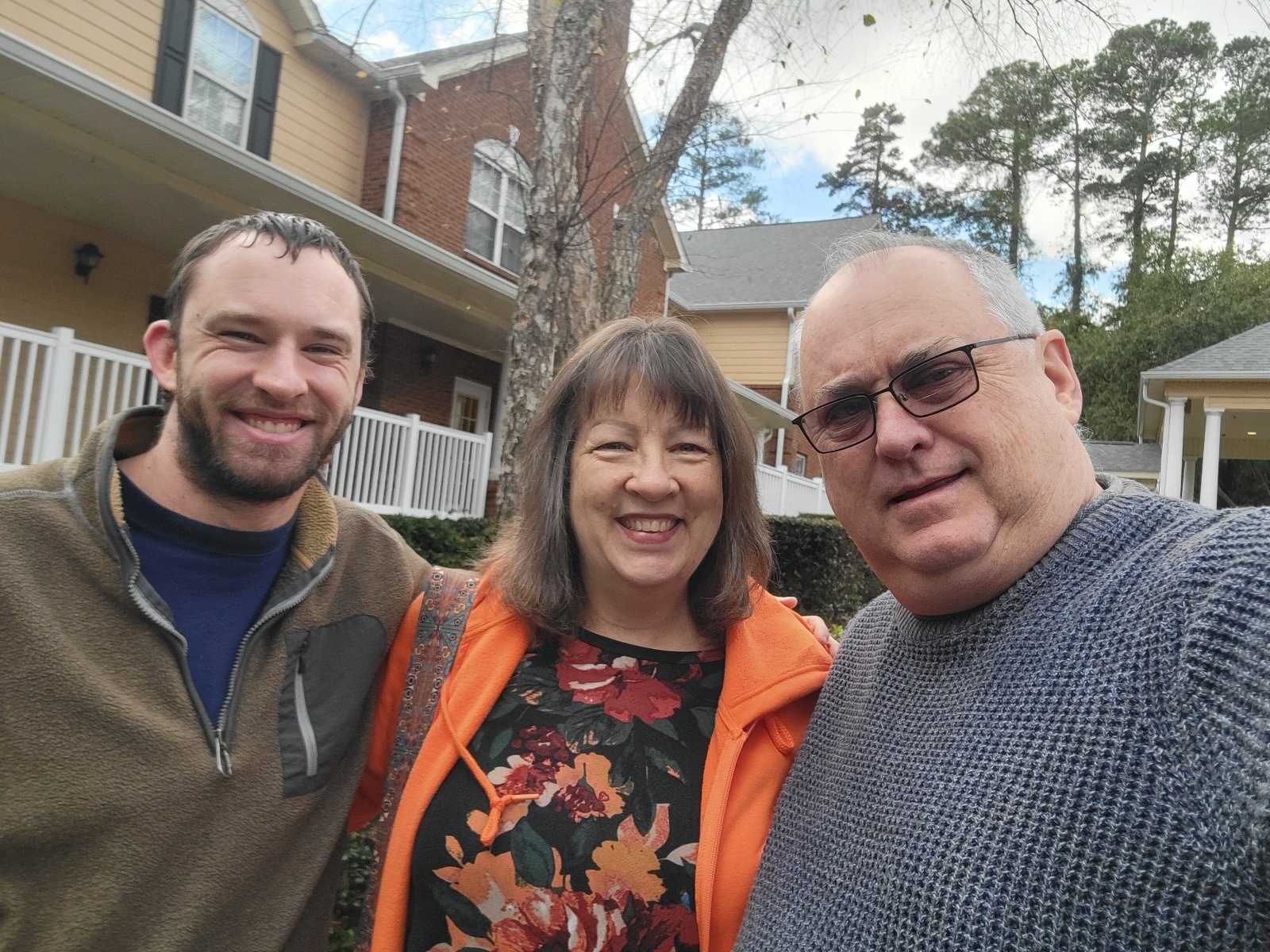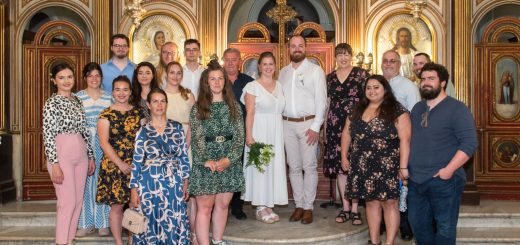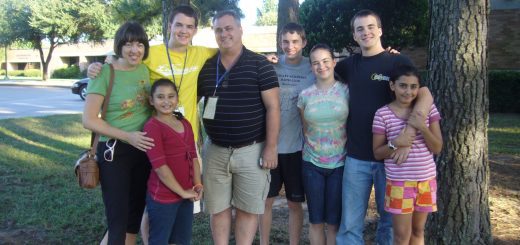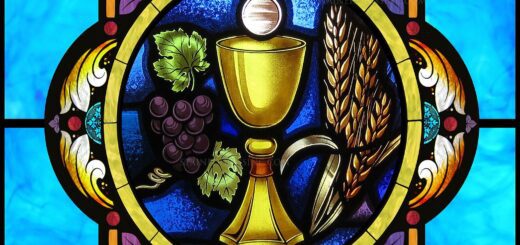Joy to the World!

“Joy to the World!” – December 1st, 2024 (Carols of Christmas, week 1)
Today we are starting a new sermon series. The Oxford Book of Carols tells us that the word carol derives from a Greek word meaning “to dance in a ring.” It goes on to say that “the typical carol gives voice to the common emotions of healthy people in language that can be understood and music that can be shared by all.”
Some say that the first carolers were the angels in Luke 2:8-14 on the night that Jesus was born – “In that region there were shepherds living in the fields, keeping watch over their flock by night. Then an angel of the Lord stood before them, and the glory of the Lord shone around them, and they were terrified. But the angel said to them, ‘Do not be afraid; for see—I am bringing you good news of great joy for all the people: to you is born this day in the city of David a Savior, who is the Messiah, the Lord. This will be a sign for you: you will find a child wrapped in bands of cloth and lying in a manger.’ And suddenly there was with the angel a multitude of the heavenly host, praising God and saying, ‘Glory to God in the highest heaven, and on earth peace among those whom he favors!’”
In the early fourth century, the church fixed the date for Christmas as December 25th, the date of the winter solstice in the Roman calendar. It is nine months after Annunciation on March 25th, the Roman date of the spring equinox. The earliest Christmas music consisted only of chants and psalms.
In 1223, St. Francis of Assisi created a living nativity scene in order to bring the Christmas story to life. Townspeople and animals came together to portray the holy family, shepherds, wise men, and manger scene. Because simple carols were sung, St. Francis became known as the father of the Christmas carol.
Caroling became popular by the time of the High Middle Ages (1000-1300 AD). Groups sang and performed Christmas carols, with the lead singer encompassed by a ring of dancers. But various writers of the time condemned caroling as lewd, likely because of the similarities to other pagan or Roman traditions.
Due to a variety of factors, including Puritanism (16th and 17th centuries), things got messy in the church when it came to the singing of carols or, really, of any hymns at all. Pastor and hymnodist Ernest Emurian tells us that some Christians in both England and America dismally believed that “God stopped singing when David died, and for believers to sing anything other than the metrical versions of the Old Testament Psalms was heresy of the worst sort.” My response to that? I. can’t. even.
By the 1700s, Christmas carols became more widely accepted and sung across the British Isles and Europe, eventually spreading throughout the world.
A 2004 article from London’s Daily Telegraph says, “We may now be more likely to hear them blasting out of supermarket sound systems than from the lips of wassailers in the streets, but carols remain central to the experience of Christmas.”
Pope John Paul II, in a meeting with Polish Pilgrims in the Christmas of 1996, described Christmas carols as “treasures … I hope that all of you, dear compatriots, whether in our homeland or here in Rome or anywhere in the world, may sing these Christmas carols, meditating on what they say, on their content, and that in them you may discover the truth about the love of God who became man for us. Many other elements could be added to today’s exchange of greetings as we listen to Christmas carols. But I like to recall the fervent announcement of peace in the Christmas carol, When Christ is Born: ‘Glory to God in the highest, and on earth peace among men with whom he is pleased.’”
Welcome to our new sermon series, The Carols of Christmas. We’re going to look closely at seven diverse Christmas carols, each one chosen for their unique perspective on the advent, the arrival, of our Lord and Savior, Jesus Christ.
[Ask volunteer to distribute Bingo cards] Each week we are also going to play Christmas Carol Bingo using a list including the names of the carols we’ll be looking at, along with some of the most popular Christmas carols of all time. Write your name on a bingo card and if you have any of these carols, mark them off. There will be cool Christmas-themed prizes for anyone who completes a card any time during this sermon series, so make sure you ask someone else to fill your card in for you if you can’t be here! Those on Zoom who would like to participate, Paul will help you fill in your cards! [Read out Christmas Carol Bingo entries – do 6 the first week plus the carol of the week, then 4 each week plus the carol of the week. Then collect the Christmas Carol Bingo cards – we will bring them out each Sunday!]The author of today’s Carol of Christmas, Isaac Watts, was born in 1674. In his youth, he complained to his father that church music was boring and unimaginative. His father initially responded, “Those hymns were good enough for your grandfather and your father, son, so they will have to be good enough for you.” Young Isaac didn’t back down, and his father angrily retorted, “If you don’t like the hymns we sing, write better ones!” Thus began Isaac Watts’ illustrious hymn writing career. Isaac Watts also went on to study theology, logic, and chemistry, eventually serving as a minister and trainer of preachers. He is best known for writing 750 hymns, single-handedly revolutionizing the congregational singing habits of the English Churches and becoming known as the “Godfather of English hymnody.”
In his late 30s, Isaac Watts suffered from such poor health that he resigned as pastor of a large London church and moved in with neighbors to recuperate. He remained with them for 36 years, spending most of the second half of his life writing hymns and books. In 1719, seven years into that new season, while working on a project to Christianize the Psalms, Watts wrote two hymns based on Psalm 98: To our Almighty Maker God and Joy to the World. He noted that “In these two hymns which I have formed out of the 98th Psalm, I have fully exprest what I esteem to be the first and chief sense of the holy Scriptures, both in this and the 96th Psalm, whose conclusions are both alike.” (As I was working on this sermon on Wednesday evening, I paused for our Midweek prayer time and was very surprised that the Psalm reading for that day was from Psalm 98! Thank you, Holy Spirit, for showing us once again that you are always working, and you do ALL things well!) In writing Joy to the World, Watts aimed to read back into Psalm 98 all of the joy of the coming Messiah. As I read this Psalm aloud in a moment, pay attention to all of the details concerning music. In Joy to the World, Watts omitted all mention of musical instruments because his congregation sang unaccompanied, in keeping with their conviction that this was proper New Testament practice. Hymnologist David W. Music remarks that “Watts probably did not intend for this text to be used as a Christmas hymn, since he was a Calvinistic Independent, a group that did not believe in the celebration of Christmas or any other ‘holy days’ except Sunday.”
Psalm 98 (NRSV) – “1 O sing to the Lord a new song, for he has done marvelous things. His right hand and his holy arm have gotten him victory. 2 The Lord has made known his victory; he has revealed his vindication in the sight of the nations. 3 He has remembered his steadfast love and faithfulness to the house of Israel. All the ends of the earth have seen the victory of our God. 4 Make a joyful noise to the Lord, all the earth; break forth into joyous song and sing praises. 5 Sing praises to the Lord with the lyre, with the lyre and the sound of melody. 6 With trumpets and the sound of the horn make a joyful noise before the King, the Lord. 7 Let the sea roar, and all that fills it; the world and those who live in it. 8 Let the floods clap their hands; let the hills sing together for joy 9 at the presence of the Lord, for he is coming to judge the earth. He will judge the world with righteousness, and the peoples with equity.”
We hear Psalm 98 quite clearly in the first two stanzas of Joy to the World:
Joy to the world, the Lord is come, Let earth receive her King; Let every heart prepare Him room, And heav’n and nature sing.
Joy to the world! the Saviour reigns; Let men their songs employ; While fields and floods, rocks, hills, and plains Repeat the sounding joy.
The third stanza of this hymn is often omitted by worship leaders and recording artists alike, possibly because of the uncomfortable nature of words like sins, sorrows, and curse. However, this stanza actually looks forward with incredible hope to the already-not-yet kingdom of God which Jesus inaugurated through his life, ministry, death, and resurrection. The third stanza beckons us to catch a glimpse of how amazingly good the good news of Jesus Christ really is! God has already begun the restoration of all things, and we can look forward to the day when God will set everything right! God’s restoration work is not limited to a few people or a corner of creation. Once we grasp that what Jesus did, especially in his death and resurrection, transformed everything and that we are now living between that initial explosive event and God’s final setting right of the world, then everything will change: our beliefs, our behaviors, our attitudes, our expectations! God has already started and will one day bring to completion the undoing of all of the terrible consequences of sin, our human choice to rebel against God, described in Genesis 3:17b-18a – “cursed is the ground because of you; in toil you shall eat of it all the days of your life; thorns and thistles it shall bring forth for you.”
Here’s the third stanza: No more let sins and sorrows grow, Nor thorns infest the ground; He comes to make His blessings flow Far as the curse is found.
As N. T. Wright said so well in his book Simply Good News: “It is because God loves the glorious world he has made and is utterly determined to put everything right that he is utterly opposed to everything that spoils or destroys that creation, especially the human creatures who were supposed to be the linchpins of his plan for how that creation would flourish.” That is why Watts emphasizes that when Christ Jesus comes again, there will be no more sins, no more sorrows, no more thorns. Jesus comes to make his restoration and blessings flow to the uttermost parts of the world and the uttermost parts of the human heart.
The carol’s fourth and final verse envisions us with a celebration of the glory, grace, truth, love, righteousness, and wonders of God whose rule goes on forever and ever!
He rules the world with truth and grace, And makes the nations prove The glories of His righteousness, And wonders of His love.
This reminds me very much of the beautiful promises of things to come in Revelation 21:1-5a, a passage that is, like the entire book of Revelation, full of apocalyptic language: “1 Then I saw a new heaven and a new earth; for the first heaven and the first earth had passed away, and the sea was no more. 2 And I saw the holy city, the new Jerusalem, coming down out of heaven from God, prepared as a bride adorned for her husband. 3 And I heard a loud voice from the throne saying, ‘See, the home of God is among mortals. He will dwell with them; they will be his peoples, and God himself will be with them; 4 he will wipe every tear from their eyes. Death will be no more; mourning and crying and pain will be no more, for the first things have passed away.’ 5 And the one who was seated on the throne said, ‘See, I am making all things new.’” We cannot even begin to imagine what our world will be like when God’s restoration and renewal are complete! We do know this, that it will be a fulfillment of all of God’s promises. Our world will then be restored to shalom, the place of wholeness, flourishing, and delight!
The tune that we sing today was composed about 120 years after the lyrics. The melody is sometimes mistakenly attributed to George Friederich Handel, because several phrases remind listeners of extracts from the Messiah choruses, “Lift up your heads,” “Comfort Ye,” and “Glory to God.” But it was written by a composer in Savannah, Georgia, who started out in business and banking to make ends meet. Lowell Mason kept working hard on his music and eventually became successful enough to eventually fund public music schools. Mason composed over 1600 hymns and many other songs. In 1836 Mason wrote the music for a hymn with lyrics drawn from Paul’s missionary journey to Antioch. But three years later, he discovered Isaac Watts’ adaptation of Psalm 98 and paired those lyrics with his composition. The hymn became an instant Christmas classic because of the timing of its release and its joyous repetition, going on to become the most published Christmas hymn in North America!
Although we know embrace this as a Christmas carol, Joy to the World can be sung throughout the year (and I encourage that!). Here at Liberty Vineyard Church, some of us have a long history with Advent, while others of us are beginning to tiptoe into this period set at beginning of the Liturgical year on the Christian calendar. Together we are growing in our understanding and experience of many ways in which to wholeheartedly worship God together. Thank you once again to each of you who have contributed to our annual Multimedia Advent Devotional project! During the season of Advent (which begins today), we can embrace three active attitudes simultaneously:
- we celebrate the coming of our Savior, Jesus Christ;
- we participate by responding to God’s invitation to us to join with Him in what He’s doing today;
- we anticipate by expectantly waiting and preparing for the return of Christ at his Parousia, or Second Coming.
Although I am fond of many Christmas carols, for as long as I can remember, whenever someone asks me to name my favorite, I have consistently chosen Joy to the World! I love this song! It doesn’t matter that the lyrics make no mention of a baby in a manger, Mary, Joseph, angels, shepherds, or wise men. It’s okay that Joy to the World was written as a poem to celebrate the second coming of Christ, not the first! Joy to the World calls us powerfully to repeat the sounding joy. We can enter into the joy of looking back on the incarnation. We can enter into the joy of joining Jesus in what God is doing in our world today. We can enter into the joy of looking forward to what God has promised in the future. Meanwhile, we sing. We sing between what is and what will be, between the already and the not yet of our faith. Advent invites us to celebrate, participate, and anticipate all at once! Let us rejoice!
Let’s close by singing this together once more –




